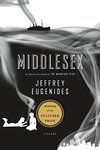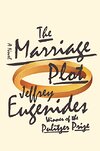Jeffrey Eugenides
Author of Middlesex
About the Author
Jeffrey Eugenides was born in Detroit, Michigan on March 8, 1960. He received a B.A. from Brown University and an M.A. in English and creative writing from Stanford University in 1986. His first novel, The Virgin Suicides, was published to in 1993 and was made into a feature film. His other works show more include Middlesex, which won the 2003 Pulitzer Prize for Fiction, and The Marriage Plot. He is a professor of creative writing at Princeton University. (Bowker Author Biography) show less
Image credit: Jeffrey Eugenides, 22nd July 2011
Works by Jeffrey Eugenides
Find the Bad Guy 9 copies
Extreme Solitude 5 copies
2003 3 copies
Midlseksa 1 copy
Early Music - Interaktives Hörbuch Englisch: Das Hörbuch zum Sprachen lernen mit ausgewählten Kurzgeschichten (2007) 1 copy
March 1 copy
Timeshare [a short story] 1 copy
Fresh Complaint 1 copy
Associated Works
Lost Classics: Writers on Books Loved and Lost, Overlooked, Under-read, Unavailable, Stolen, Extinct, or Otherwise Out… (2000) — Contributor — 305 copies, 6 reviews
Object Lessons: The Paris Review Presents the Art of the Short Story (2012) — Introduction — 239 copies, 9 reviews
McSweeney's Issue 42 (McSweeney's Quarterly Concern): Multiples (2013) — Contributor — 67 copies, 2 reviews
(show all 11show less)
Tagged
Common Knowledge
- Canonical name
- Eugenides, Jeffrey
- Legal name
- Eugenides, Jeffrey Kent
- Birthdate
- 1960-03-08
- Gender
- male
- Nationality
- USA
- Birthplace
- Detroit, Michigan, USA
- Places of residence
- Chicago, Illinois, USA
Berlin, Germany
Princeton, New Jersey, USA - Education
- University Liggett School (Grosse Point, Michigan)
Brown University (B.A. | 1983)
Stanford University (M.A. | Creative Writing) - Occupations
- short story writer
teacher
editor
novelist - Organizations
- Princeton University
- Awards and honors
- Whiting Writers' Award (1993)
Granta's Best Of Young American Novelists (1996)
Members
Discussions
The Virgin Suicides in Someone explain it to me... (July 2013)
Reviews
Like the hermaphrodite narrator of Middlesex, my first copy of this novel had extra "body parts," although in my book's case it's duplicative sets of pages 85 through 116, rather than male and female anatomy. The first set was physically in a place it wasn't supposed to be (immediately after page 52), but unlike the narrator's extra parts, my book's deformity didn't cause dysphoria and was easily replaced by a new, sequentially correct copy.*
It seems not merely ironic but somehow appropriate show more that my book was born malformed. As the half-star rating indicates, I didn't care for this book (when will I learn to stick to my rule not to read Pulitzer Prize winning books published after 1998?). Part of my dislike stems from the books organizational style: choppy blocks of narrative, some short as commercials, others the length of documentaries, that alternate between the narrator's family story and her/his present day life. A present day which never becomes germane to the story (more on that later).
Some of my dislike stems from the unending procession of dysfunction in the plot. A Greek brother and sister marry and have two children, then hide their lineage from everyone until the end of the novel (which is supposedly the big reveal). The son from this incestuous relationship marries his cousin; together they have Calliope, the hermaphrodite narrator of the novel. As a result, Calliope's first cousin twice-removed is also her/his grandmother, her/his father is also his parents' nephew and her/his brother is also her/his third cousin. All this nonsense to rationalize the origins of Calliope's genetic deformity.
Primarily, though, I simply dislike the piling on of pointless details that turned what might have been an interesting 200-or-so page story into a 529 page slog. There's a three-hundred word description of the implausible effects a woman fanning herself downstairs has on the household dust upstairs and on a passing car outside. There's a fourteen-year-old runaway in a bus stop walking past a group of priests and magically knowing they are from Sri Lanka, a fact which has zero bearing on the story (if this complaint seems trivial, know that this scene occurred late in the novel when I was suffering severe overload). Here's the same girl earlier, describing herself hiding on the school toilet: "In the basement bathroom was a time frame I felt much more comfortable with, not the rat race of the school upstairs but the slow, evolutionary progress of the earth, of its plant and animal life forming out of the generative, primeval mud." Only an author trying to elevate a meaningless event into cosmic revelation writes that sentence. And most frustratingly, that garbage precedes a perfectly believable scene of the girl's parents lying in bed worrying about her.
In other reviews, I have wondered how the novel being reviewed merited a Pulitzer, a question that arose early in my reading of said novel. Yet I read it through in hope of answering that question by the time I finished. This novel is no different. Early in the book, Calliope pees on the priest performing her baptism, and we are led to believe the urine stream is capable of traveling the miraculous distance it does because she has a penis. Later, however, we learn that her penis has no opening, that her urine comes out from underneath it. Even in a book as fantastical as Middlesex, such an inconsistency shouldn't exist - not in a Pulitzer Prize winning book.
Jeffrey Eugenides, the author, is undoubtedly imaginative and has talent. I read that it took him nine years to finish this novel. My guess is that he spent the first eight on Calliope's heritage, because the novel's conclusion, where she/he finally comes center stage and becomes Cal, feels rushed and incomplete in comparison to the time spent building to the transformation. It reminds me of what Benjamin Dreyer wrote at the end of his book on grammar, Dreyer's English (which I highly recommend): "I think perhaps you don't finish writing a book. You stop writing it."
* - I do wonder whether the previous owner abandoned the book before discovering its defect, thus innocently inflicting it upon me, or sold it after discovery, thus maliciously inflicting it on me for the two or three dollars they got from Half Price Books. Unfortunately I will just have to wonder. show less
It seems not merely ironic but somehow appropriate show more that my book was born malformed. As the half-star rating indicates, I didn't care for this book (when will I learn to stick to my rule not to read Pulitzer Prize winning books published after 1998?). Part of my dislike stems from the books organizational style: choppy blocks of narrative, some short as commercials, others the length of documentaries, that alternate between the narrator's family story and her/his present day life. A present day which never becomes germane to the story (more on that later).
Some of my dislike stems from the unending procession of dysfunction in the plot. A Greek brother and sister marry and have two children, then hide their lineage from everyone until the end of the novel (which is supposedly the big reveal). The son from this incestuous relationship marries his cousin; together they have Calliope, the hermaphrodite narrator of the novel. As a result, Calliope's first cousin twice-removed is also her/his grandmother, her/his father is also his parents' nephew and her/his brother is also her/his third cousin. All this nonsense to rationalize the origins of Calliope's genetic deformity.
Primarily, though, I simply dislike the piling on of pointless details that turned what might have been an interesting 200-or-so page story into a 529 page slog. There's a three-hundred word description of the implausible effects a woman fanning herself downstairs has on the household dust upstairs and on a passing car outside. There's a fourteen-year-old runaway in a bus stop walking past a group of priests and magically knowing they are from Sri Lanka, a fact which has zero bearing on the story (if this complaint seems trivial, know that this scene occurred late in the novel when I was suffering severe overload). Here's the same girl earlier, describing herself hiding on the school toilet: "In the basement bathroom was a time frame I felt much more comfortable with, not the rat race of the school upstairs but the slow, evolutionary progress of the earth, of its plant and animal life forming out of the generative, primeval mud." Only an author trying to elevate a meaningless event into cosmic revelation writes that sentence. And most frustratingly, that garbage precedes a perfectly believable scene of the girl's parents lying in bed worrying about her.
In other reviews, I have wondered how the novel being reviewed merited a Pulitzer, a question that arose early in my reading of said novel. Yet I read it through in hope of answering that question by the time I finished. This novel is no different. Early in the book, Calliope pees on the priest performing her baptism, and we are led to believe the urine stream is capable of traveling the miraculous distance it does because she has a penis. Later, however, we learn that her penis has no opening, that her urine comes out from underneath it. Even in a book as fantastical as Middlesex, such an inconsistency shouldn't exist - not in a Pulitzer Prize winning book.
Jeffrey Eugenides, the author, is undoubtedly imaginative and has talent. I read that it took him nine years to finish this novel. My guess is that he spent the first eight on Calliope's heritage, because the novel's conclusion, where she/he finally comes center stage and becomes Cal, feels rushed and incomplete in comparison to the time spent building to the transformation. It reminds me of what Benjamin Dreyer wrote at the end of his book on grammar, Dreyer's English (which I highly recommend): "I think perhaps you don't finish writing a book. You stop writing it."
* - I do wonder whether the previous owner abandoned the book before discovering its defect, thus innocently inflicting it upon me, or sold it after discovery, thus maliciously inflicting it on me for the two or three dollars they got from Half Price Books. Unfortunately I will just have to wonder. show less
This should be titled, "The Pretentious Plot." I disliked every single character from the main three to the parents to the random friends who make seldom appearances. Literally, the only character I found somewhat amusing was the semiotics professor who didn't speak. Every person in this book was shallow, unrealistic, selfish, and not all that intelligent as they claimed to be. This novel felt very forced and convenient; I could smell the plot twists miles away. Nothing about it surprised show more me, other than the fact that Leonard didn't commit suicide, which was what I wanted so something interesting and REAL could occur. I was so sick and tired of listening to these characters bitch and moan about being rich (but unwilling to purchase new glasses and complaining about being frivolous on their trip(S) to Europe), being smart (but making idiotic choices and lacking common sense and only talking about how smart they are), and being in love when each character wasn't capable because they spent their energy on only loving themselves. I'm really disappointed in this novel after reading Virgin Suicides and saving Middlesex for a rainy day, but at least I still have the Pulitzer winner.
Only positive thing I can say, is to thank Mr. Eugenides for discussing literature so frequently in his novel as it has increased my to-read list. But mind you, I was only intrigued by the third-person omniscient narrator, not by Madeleine's naive concept of the world. show less
Only positive thing I can say, is to thank Mr. Eugenides for discussing literature so frequently in his novel as it has increased my to-read list. But mind you, I was only intrigued by the third-person omniscient narrator, not by Madeleine's naive concept of the world. show less
Quanto è difficile recensire questo romanzo! Quando l'ho chiuso tutto mi era perfettamente chiaro, sapevo cosa scrivere: le emozioni che avevo provato nella lettura erano esposte davanti a me come tanti quadri in una galleria d'arte. Ora però è diverso: ogni volta che cerco di descrivere cosa ho provato durante la lettura, mi accorgo che saltano fuori sempre nuovi dettagli che portano con loro nuove emozioni, nuovi occhi con cui guardare questo straordinario romanzo e che a loro volta show more svelano particolari che alla prima lettura non avevo colto. E' in questo modo che, recensire questo libro, si è trasformato per me in un intricatissimo labirinto.
Eppure questa rete di suggestioni, queste immagini cosi ricche di echi sono supportate da una narrazione di rara chiarezza e tutt'altro che difficile da usufruire.
Eugenides è un narratore di classe, che non ha bisogno di stupire con effetti speciali e il suo tono colloquiale e brillante è ampiamente sufficiente per aprire interi oceani emotivi nell'animo del lettore.
Davanti agli occhi lettore si dispiega, così, senza intoppi, una storia che riesce ad essere allo stesso tempo epica e personale che, attraverso le vicende della famiglia Stephanides e la voce del suo membro più "particolare", Calliope altrimenti detta "Cal", ci insegna una lezione fondamentale: l'unica via per salvarci è contrapporre ad un sistema che impone uniformità e omologazione, la nostra storia e la nostra irriducibile "specialità". show less
Eppure questa rete di suggestioni, queste immagini cosi ricche di echi sono supportate da una narrazione di rara chiarezza e tutt'altro che difficile da usufruire.
Eugenides è un narratore di classe, che non ha bisogno di stupire con effetti speciali e il suo tono colloquiale e brillante è ampiamente sufficiente per aprire interi oceani emotivi nell'animo del lettore.
Davanti agli occhi lettore si dispiega, così, senza intoppi, una storia che riesce ad essere allo stesso tempo epica e personale che, attraverso le vicende della famiglia Stephanides e la voce del suo membro più "particolare", Calliope altrimenti detta "Cal", ci insegna una lezione fondamentale: l'unica via per salvarci è contrapporre ad un sistema che impone uniformità e omologazione, la nostra storia e la nostra irriducibile "specialità". show less
When I read summaries of The Marriage Plot it doesn’t sound that interesting to me. Three Ivy League college kids in the ‘80s graduate and try to figure out what to do with their lives. First there’s Madeleine, a clever girl, except when it comes to love. Then there’s Leonard, the passionate, but troubled man she falls for. Finally we have Mitchell, the intellectual who struggles with the question of faith and his unrequited love for Madeleine. It just doesn’t sound to original. show more Then I remember who the author is: Jeffrey Eugenides, who wrote Middlesex, which I loved! Suddenly the book is a must read and I know that however simple the plot sounds on the surface, they’ll be a whole different level of depth reached by the end. I’m so glad I Brenna at Literary Musings sent her copy my way!!!
So here’s the things about the summary, it doesn’t capture anything about why the book is good. It misses all of the nuances when you smack a “troubled twenty-somethings” label on it or reduce it to another love triangle book. Sure, there’s a love triangle, but the reason it is interesting is because it’s not really about the love or the triangle, it’s about the people caught up in it and what they’re thinking about life in general, not just love. You’re doing the book a huge disservice if you try to put a simple label on something so complicated. Imagine calling Middlesex a coming-of-age story and thinking that covered it!
The book rotates between all three characters’ lives. I particularly loved Mitchell's parts, where he's traveling and trying to figure out what he believes. I’ve found that when I travel on my own I learn a lot about myself. You have so much more time for internal dialogue and you’re put in situations outside of your comfort zone that test you in different ways. His experiences rang true for me. I also loved reading about Madeleine’s literary pursuits. Eugenides manages to weave dozens of references to classic books and to make those century old plots relevant in the story.
I didn’t love this one as much as Middlesex, but I loved so many aspects of it. I also love reading a book that gives me something to chew on. There were a few parts that became repetitive or lagged a bit, but the amount of literary eye candy I got was enough to balance it out for me. After just reading Middlemarch and The Portrait of a Lady this year, I loved reading a book that paralleled those in some ways.
The book doesn’t have the same epic scale or sense of humor as Middlesex, but it also doesn’t have the same disconnected aloof style of The Virgin Suicides. It feels like a book written by an author who may have found his groove. He can capture characters beautifully and lay them out in a way that is both interesting and accessible. In The Marriage Plot he has created a world that is easy to connect to, but also gives you so much to ponder. His story is about trying to figure out who you are, both in relation to other people and to the world at large. It’s about the unexpected paths your life can take and the people who you didn’t know would one day be important. I know that I’ll be reading whatever he writes next, even if it takes another decade.
"She thought a writer should work harder writing a book than she did reading it."
“There were some books that reached through the noise of life to grab you by the collar and speak only of the truest things.” show less
So here’s the things about the summary, it doesn’t capture anything about why the book is good. It misses all of the nuances when you smack a “troubled twenty-somethings” label on it or reduce it to another love triangle book. Sure, there’s a love triangle, but the reason it is interesting is because it’s not really about the love or the triangle, it’s about the people caught up in it and what they’re thinking about life in general, not just love. You’re doing the book a huge disservice if you try to put a simple label on something so complicated. Imagine calling Middlesex a coming-of-age story and thinking that covered it!
The book rotates between all three characters’ lives. I particularly loved Mitchell's parts, where he's traveling and trying to figure out what he believes. I’ve found that when I travel on my own I learn a lot about myself. You have so much more time for internal dialogue and you’re put in situations outside of your comfort zone that test you in different ways. His experiences rang true for me. I also loved reading about Madeleine’s literary pursuits. Eugenides manages to weave dozens of references to classic books and to make those century old plots relevant in the story.
I didn’t love this one as much as Middlesex, but I loved so many aspects of it. I also love reading a book that gives me something to chew on. There were a few parts that became repetitive or lagged a bit, but the amount of literary eye candy I got was enough to balance it out for me. After just reading Middlemarch and The Portrait of a Lady this year, I loved reading a book that paralleled those in some ways.
The book doesn’t have the same epic scale or sense of humor as Middlesex, but it also doesn’t have the same disconnected aloof style of The Virgin Suicides. It feels like a book written by an author who may have found his groove. He can capture characters beautifully and lay them out in a way that is both interesting and accessible. In The Marriage Plot he has created a world that is easy to connect to, but also gives you so much to ponder. His story is about trying to figure out who you are, both in relation to other people and to the world at large. It’s about the unexpected paths your life can take and the people who you didn’t know would one day be important. I know that I’ll be reading whatever he writes next, even if it takes another decade.
"She thought a writer should work harder writing a book than she did reading it."
“There were some books that reached through the noise of life to grab you by the collar and speak only of the truest things.” show less
Lists
Secrets Books (1)
Favourite Books (1)
USA Road Trip (1)
Five star books (1)
"We" narration (1)
Cult Classics (1)
BIRDS IN FICTION (1)
Elegant Prose (1)
First Novels (1)
Best First Lines (1)
A Novel Cure (2)
Gen X Library (2)
Unread books (2)
Overdue Podcast (2)
My TBR (2)
Epic Fiction (1)
AP Lit (1)
Romans (1)
1990s (1)
To Read (1)
sad girl books (1)
LOVE LOVE LOVE (1)
2000s decade (1)
sad girl books (1)
Florida (1)
Books for Birute (1)
Awards
You May Also Like
Associated Authors
Statistics
- Works
- 33
- Also by
- 11
- Members
- 48,656
- Popularity
- #323
- Rating
- 4.0
- Reviews
- 1,235
- ISBNs
- 332
- Languages
- 26
- Favorited
- 177
Charts & Graphs
Loading





























































